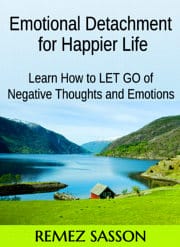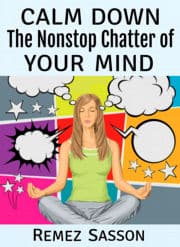
Welcome to today’s lesson on personal freedom. In this lesson, we will delve into the concept of freedom, examine the extent to which our thoughts are influenced by others, and explore the factors that shape our actions.
We will also discuss strategies and guidance to help you attain mental and emotional freedom.
The Nature of Freedom
Freedom is a multifaceted concept that encompasses various aspects of human existence. While freedom can be understood in political, social, and physical terms, we will focus on freedom of thought, attitude, and action.
- Freedom of thought is the ability to generate and develop ideas, opinions, and beliefs independently.
- Freedom of attitude involves forming and expressing attitudes and emotions without undue influence or coercion.
- Lastly, freedom of action implies the ability to make choices and act in accordance with one’s values and principles.

Browse our online courses on meditation, positive thinking, overcoming procrastination, confidence, and freedom from distractions.
Stay Calm, Free, and Happy – Master Emotional Detachment Now!
The Influence of Others
People are social beings, and their thoughts and behaviors are undoubtedly shaped by their interactions with others.
We are exposed to different ideas, beliefs, and perspectives from an early age, which influence how we think.
Family, friends, teachers, and society play significant roles in shaping our thoughts and attitudes. This influence can range from subtle to explicit, and it is essential to recognize its impact on our thinking.
Personal Freedom, Autonomy and Authenticity
While external influences are inevitable, it is crucial to cultivate autonomy and authenticity in our thinking.
Autonomy means taking ownership of our thoughts and beliefs, critically evaluating the ideas presented to us, and developing independent thinking. This, of course, means personal freedom.
Authenticity involves staying true to ourselves, aligning our thoughts and actions with our core values and principles, and not succumbing to societal pressures or conforming for the sake of acceptance.
Overcoming Programming and Conditioning
Society, culture, and personal experiences can condition our thinking and behavior. This conditioning often manifests as subconscious biases, limiting beliefs, and societal norms that can restrict our freedom.
To break free from such programming, it is essential to cultivate self-awareness and engage in critical reflection. By questioning our assumptions, examining our beliefs’ origins, and challenging societal norms, we can gradually free ourselves from unconscious influences.
Seek Diverse Perspectives
To broaden your understanding and enhance your freedom of thought, seeking out diverse perspectives and engaging in open-minded discussions is essential.
Listening to and respecting different viewpoints enables you to analyze and expand your thoughts critically.
Embracing intellectual diversity fosters growth, challenges preconceived notions, and promotes independent thinking. This leads to a free mind that can see everything from a broader perspective.
Cultivating Emotional and Mental Freedom
Achieving mental and emotional freedom involves developing resilience, self-confidence, and emotional intelligence. It requires understanding and managing our own emotions, building healthy boundaries, and not allowing external circumstances or the opinions of others to dictate our emotional state.
Practices such as mindfulness, self-reflection, and self-care can support the cultivation of emotional and mental freedom.
Guidance for Mental and Emotional Freedom
- Practice self-reflection: Regularly examine your thoughts, beliefs, and emotions to identify any patterns or influences that may hinder your freedom.
- Seek knowledge: Expand your understanding by reading books, attending lectures, and exploring different disciplines and perspectives.
- Surround yourself with diverse influences: Engage with individuals who challenge your thinking and expose yourself to a variety of viewpoints.
- Embrace uncertainty: Be open to questioning your beliefs and be willing to adapt and evolve as new information becomes available.
- Develop self-compassion: Treat yourself with kindness and understanding, allowing for growth and learning from past experiences.
- Set boundaries: Establish clear boundaries to protect your mental and emotional well-being, ensuring that your thoughts and actions align with your values.
Enjoying freedom means learning not to take things personally and not allowing other people’s stories, thoughts, and feelings to affect how you feel and act.
It also means control of your mind and not allowing negative thoughts and worries to fill your mind. This has been fully explained in the books Emotional Detachment for Happier Life and Calm Down the Nonstop Chatter of Your Mind.
Freedom Examples and Inspiration
Here are some examples and inspirational anecdotes to further illustrate the concepts discussed in the lesson:
Examples of Influences on Freedom
Family: A person growing up in a conservative household may initially adopt their family’s political and social views.
However, as they gain exposure to different perspectives in school or through personal experiences, they may begin questioning and forming their own beliefs.
Peer Pressure: Teenagers often face peer pressure to conform to certain behaviors or attitudes. For example, a teenager may start dressing a certain way or adopting specific interests to fit in with a particular social group, even if it goes against their authentic self.
Example of Inspirational Figure
Mandela spent 27 years in prison for his activism against apartheid in South Africa. Despite the physical confinement, he maintained mental and emotional freedom by refusing to let his captors dictate his attitude and beliefs.
Upon his release, he continued to advocate for equality and forgiveness, demonstrating the power of personal freedom in the face of adversity.
Overcoming Conditioning
A person raised in a culture with strict gender roles may initially believe that certain careers or activities are off-limits based on their assigned gender.
However, exposure to diverse role models and challenging social norms allows you to break free from this conditioning and pursue your passions without limitations.
Seeking Diverse Perspectives
Attending a multicultural event or participating in a dialogue with individuals from different backgrounds can expose us to diverse perspectives.
By actively listening and engaging in respectful conversations, we can broaden our understanding and challenge our own preconceived notions. This can lead to a greater sense of freedom in our thoughts and attitudes.
Cultivating Emotional and Mental Freedom
Meditation and mindfulness practices can help you detach from negative emotions or external influences. This allows you to observe your thoughts without judgment.
This practice enhances emotional intelligence and empowers individuals to respond to situations based on their own values rather than being reactive to external triggers.
Final Words
Remember, these examples and inspirations serve as reminders that personal freedom is attainable, and we can shape our thoughts and actions without the impact and influence of the environment and media.
To make this happen, you need to work on it by practicing various techniques and exercises to gain your true freedom. This website is dedicated to bringing you the information, guidance, and instructions to become free.
In conclusion, personal freedom is a complex and dynamic aspect of our lives. While we are influenced by others and shaped by our environment, we have the power to cultivate independent thinking.
By reflecting on our beliefs, seeking diverse perspectives, and developing emotional and mental freedom, we can navigate a path that is true to ourselves.
Remember, personal freedom is a lifelong journey requiring continuous self-examination and growth. Embrace your Freedom, trust your thoughts, and act according to your values to attain true freedom.
Browse our online courses on meditation, positive thinking, overcoming procrastination, motivation, confidence, and freedom from distractions.


